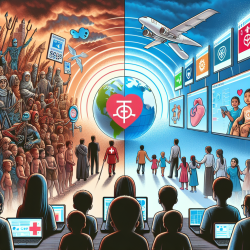Introduction
Corruption in the health sector is a pervasive issue that undermines the quality of care and access to essential health services, directly impacting outcomes for children and vulnerable populations. The research article, "The Sustainable Development Goals as a Framework to Combat Health-Sector Corruption," provides a comprehensive framework for addressing these challenges through the lens of the United Nations' Sustainable Development Goals (SDGs).
The Role of SDGs in Combating Corruption
The SDGs offer a strategic framework to address health-sector corruption by promoting justice, strong institutions, and sustainable human development. Specifically, SDG 3 aims to ensure healthy lives and promote well-being for all, while SDG 16 focuses on promoting peace, justice, and strong institutions. These goals provide a roadmap for practitioners to align their efforts with global standards in combating corruption.
Implementing the Framework
For practitioners in the field of speech-language pathology and other health-related disciplines, implementing the SDG framework involves several key steps:
- Understanding Corruption Dynamics: Familiarize yourself with the types of corruption prevalent in the health sector, such as informal payments, absenteeism, and reimbursement fraud. This knowledge is crucial for identifying and mitigating risks in your practice.
- Promoting Transparency and Accountability: Advocate for transparent practices within your organization and collaborate with stakeholders to ensure accountability. This can include adopting e-procurement systems and open contracting to reduce opportunities for corruption.
- Engaging in Continuous Education: Stay informed about the latest research and developments in combating health-sector corruption. Encourage your team to participate in training sessions and workshops that focus on integrity and ethical practices.
Encouraging Further Research
While the SDGs provide a robust framework, further research is essential to develop innovative solutions tailored to specific contexts. Practitioners are encouraged to contribute to this body of knowledge by conducting studies that explore the impact of corruption on child health outcomes and the effectiveness of anti-corruption interventions.
Conclusion
Addressing health-sector corruption is critical for ensuring equitable access to quality health services and improving outcomes for children. By leveraging the SDGs, practitioners can play a pivotal role in fostering a culture of transparency and accountability, ultimately contributing to the global effort to combat corruption.
To read the original research paper, please follow this link: The sustainable development goals as a framework to combat health-sector corruption.










